While we’re all pretty much working or staying at home these days, many virtual museums and online galleries across Canada are sharing digital options online instead of welcoming in-person visits.
Some galleries are creating elaborate new digital developments on their own, some are partnering with other arts organizations across the country to supplement their existing online experiences. Some have gone global.
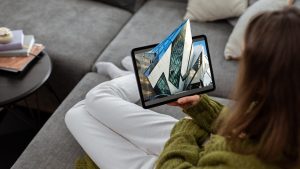
Virtual visits are more popular and more necessary these days. The Royal Ontario Museum is among many Canadian arts organizations offering online alternatives to in-person visits. Image from the Royal Ontario Museum.
Many Canadian galleries are part of Google’s Arts and Culture initiative, and when integrated with the Google Streetview app, anyone can take virtual walking tours inside or outside the facility, be it the Vancouver Art Gallery, the Royal Ontario Museum, or the McCord Museum in Montreal, among others.
Regardless of the gallery, and in celebration of the centenary of the first art exhibition by those famous Canadian artists in the Group of Seven, Google also has a dedicated section to introduce what it calls “the most important art movement you’ve never heard of.”
Meanwhile, the Art Gallery of Greater Victoria is one of a number of partners in a new national digital arts initiative called Field Trip: Art Across Canada. It and more than two dozen other art galleries across the country are staging special children’s art workshops, conducting interviews with leading artists, and talking about art in the COVID Age. You can join in from your desktop.
Commercial galleries are also part of the virtual art experience: they not only show art, they represent artists trying to make a living in these tough times by selling their art. Several galleries in Saskatchewan, for example, have banded together to put art for show and for sale on their dedicated website.
Another terrific art experience online is offered by the Art Gallery of Hamilton, where its part of the field trip is, well, motorized!
Canadian artist Kim Adams combines humour, insight, metaphor and cultural critique in his mixed-media sculptures, often built using familiar real-world items.
Like a Volkswagen bus from the 1960s!
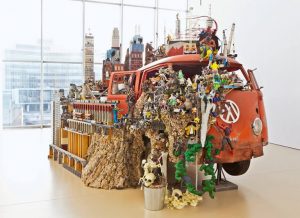
Virtual museum visits and online galleries are providing stay-at-home art experiences, even though the art may scream “road trip!” Kim Adams, Bruegel-Bosch Bus, 1997-ongoing. 1960s Volkswagen bus, figurines, mixed media. Acquired with the assistance of the York Wilson Endowment Award at The Canada Council for the Arts, and with finds from The E. Muriel Baker Estate and The Russell Nelson Eden Estate, 2001. Art Gallery of Hamilton.
It’s fun, it’s incredibly detailed, and like many of Adams’s pieces, it is not quite finished yet! The artist often adds to his sculptures for years after their first appearance. He started the Bruegel-Bosch Bus back in 1997.
Today’s coronavirus pandemic itself adds meaning to the piece: in many ways, the installation is a commentary on the end of the world, our own self-destructive behaviour, and the folly of our choices in the face of much greater forces than ourselves.
Perhaps now more useful than ever, many galleries and museums, including the aforementioned ROM, have long had elements of their collection online, usually served up through a convenient search engine with keywords, artworks, and artist names among the actionable terms. The ROM has over 47,000 objects in its online collection (out of some 13 million objects overall); still, that’s more than you could take in during an in-person visit.
The Aga Khan Museum is opening up access to its exhibits and archives even though its doors, too, are closed for the duration. Its Museum Without Walls initiatives include 3-D virtual tours, online performances as well as informative talks by curators, artists, and educators.
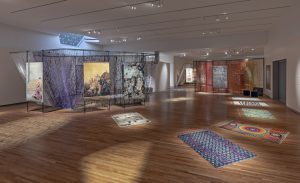
The Aga Khan Museum is offering a 3-D virtual tour of the exhibit called Sanctuary, a word which surely has a much more profound meaning these days. Image © Aga Khan Museum, 2020 Photo credit: Toni Hafkenscheid.
With a new featured exhibit or artistic theme appearing online every week, the Aga Khan Museum provides a welcome respite from our current situation: The Moon: A Voyage Through Time exhibition featured remarkable sculptures and artifacts illustrating our long fascination with “this enchanting orb in the sky”.
And, as this post was written, the Aga Khan Museum’s social media platforms were sharing news about its next 3-D virtual tour of the exhibit called Sanctuary, a word which surely has a much more profound meaning these days.
Beautifully woven rugs are combined with used T-shirts in an immersive commentary on what concepts like home, shelter, materialism, and consumption might still mean.
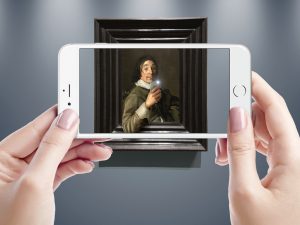
ReBlink is one of the Art Gallery of Ontario’s recent digital initiatives; the AGO has also launched AGO From Home as an alternative to in-person visits. Image from Impossible Things / AGO.
With a collection of more than 90,000 works of art, the Art Gallery of Ontario is one of the largest art museums in North America. In addition to its vast searchable online collection of paintings, photographs, sculptures and other objets d’art, the AGO has staged several dedicated exhibits that make the most of immersive digital technologies: you can get up close and go inside remarkable miniature boxwood sculptures from the Medieval Era; you can search through the tragic photographic memories from the Lodz Ghetto and World War II, or you can re-imagine great works of art with the special augmented reality ReBlink app.
And while it is currently closed due to the coronavirus pandemic, the AGO is triggering new artmaking activities and workshops for young and old alike as part of its AGO From Home online programming, and it is adding videos from past live events to its extensive YouTube channel, including timely talks (Naomi Klein, Salman Rushdie) and great performances (Zadie Xa) you may have missed.
It’s hard to miss anything at the Art Gallery of Nova Scotia, even if you can’t visit in person.
That’s thanks to a multi-function virtual tour that lets you navigate the Gallery and individual exhibit spaces inside the building, using an exploding augmented reality floor plan.
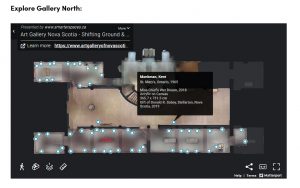
A multi-function virtual tour of the Art Gallery of Nova Scotia lets you navigate the building and individual exhibit spaces from home.
It shows hotspots throughout the Gallery that you can click on to select specific artworks and learn much more about the piece and the artist who created it.
Using a combination of portable 3-D laser scanners, CAD software, data analysis tools, wayfinding protocols, and curator expertise, tech companies like Canada’s Smarter Spaces and California-based Matterport are creating interactive 3-D virtual tours and VR experiences that let you visit places like your favourite art gallery or museum from the comfort of your own home.
# # #

Sadly, Canada’s art galleries and museums, such as the Aga Khan Museum pictured here, are currently closed due to the coronavirus pandemic. Online collections and virtual visits offer immersive alternatives to in-person visits. Image © Aga Khan Museum. Photo credit Janet Kimber.
-30-
WhatsYourTech.ca has more COVID-19 related technology articles you can read; please visit our new dedicated articles listing page.



